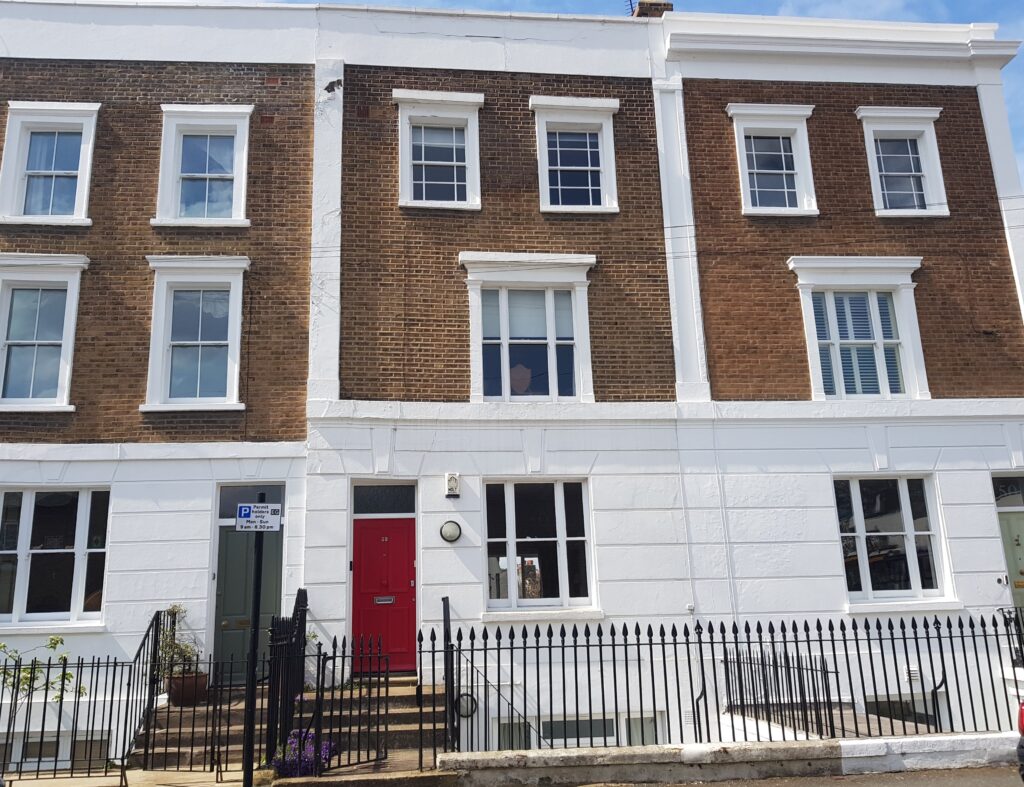Should I Invest in Property?
Investing is a key strategy for securing one’s financial future whether for themselves or future generations. Investing can also be a way to generate an additional income. Of the range of investment options available, each has its own risks and rewards and the decision-making process can be daunting.
Among the numerous investment opportunities available, property investment has shown to have steady historical growth making it a reliable asset class for investors. However, before diving into the world of property investment, it’s crucial to weigh up the pros and cons to determine if property investment aligns with your own financial goals and risk tolerance.
The Property Investment Market In London
The London property market is historically known for its buoyancy and international appeal to overseas investors. The city’s economic stability, cultural significance and strong demand for housing are well established incentives for potential investors.
Investing in the London property market can offer strong advantages for investors looking to diversify their portfolio and capitalise on the long-term growth opportunities London and the surrounding areas can offer.
Why investing in the London Property Market Can Be Advantageous for Investors:
Global Financial Centre: London is a global financial hub, attracting businesses and professionals from around the world. This contributes to a steady demand for both residential and commercial properties. The results of the 2021 Census showed that London’s population had reached 8.80 million, up from 8.17 million in 2011, showing an ever-increasing demand for housing.
Industries: London has several established industries particularly in the financial and professional services. Science and Tech industries are growing sectors for London and this growth and activity does attract businesses and professionals who want to live and work in the area.
Strong Rental Market: London’s rental market is robust, driven by a large and increasing population, a steady influx of students and professionals and limited housing supply. This presents opportunities for investors to generate rental income from residential properties, particularly in sought-after areas. In the previous 12 months to January 2024, the ONS stated that London rental prices had increased by 6.9%, the highest annual percentage change compared to anywhere else in the UK.
Capital Appreciation: Historically property prices in London have shown consistent long-term appreciation, typically outpacing inflation rates. Whilst recent years particularly have shown us that there can be short-term fluctuations, the overall trend tends to be upward, offering potential capital gains for investors over time.
Leisure & Culture: London’s cosmopolitan nature and cultural richness and diversity make it a desirable destination for businesses, professionals and visitors worldwide. International investors are attracted to the city’s prestige and global connectivity.
Educational Institutions: London is home to some of the world’s top universities and educational institutions and attracts students from across the globe. This creates a constant demand for student accommodation and rental properties, particularly in areas near universities.
Infrastructure & Regeneration Projects: Ongoing infrastructure projects, such as transportation improvements and urban regeneration initiatives, enhance the appeal and attractiveness of certain areas in London. Investing in properties located near these developments can offer potential for future appreciation. The recently opened Crossrail is an example of a large-scale transport project that has benefited the city as a whole and the local areas near stations. Similarly HS2, a National network rail upgrade which will connect London to Birmingham, is set to open in the 2030’s.
Diverse Property Options: London offers a wide range of property types from luxury flats in central locations to suburban family homes and commercial properties. This diversity allows investors to tailor their investment strategies according to their preferences, risk tolerance and financial goals.
Resilience to Market Volatility: Despite occasional market downturns or economic uncertainties, London’s property market has historically demonstrated resilience and the ability to recover and thrive over the long term.
While investing in the London property market offers numerous benefits, it’s essential for investors to conduct thorough research, consider their investment objectives and risk tolerance and seek professional advice to make informed decisions. Additionally staying up to date with market trends and regulatory changes can help investors navigate London’s active property investment market.

Is Investing in Property Worthwhile?
Before answering whether you should invest in property, firstly you need to know what property investing is and what does it involve.
Property investing involves purchasing, owning, managing, renting, or selling property for the purpose of generating income or capital appreciation. Property investment encompasses various strategies, including residential properties (such as single-family homes, houses of multiple occupation (HMOs) and blocks of flats), commercial properties (such as office buildings, commercial retail spaces, and industrial units) and land development.
Pros of Investing in Property:
Steady Income Stream:
Rental income from properties can provide a consistent cash flow, offering a reliable source of relatively passive income. Unlike other investments that may be subject to market volatility, rental income tends to be more stable providing financial security and flexibility.
Appreciation Potential:
Historically property investment tends to appreciate over time, thereby increasing the value of your investment. This appreciation can result from various factors such as economic growth, development or regeneration in the area, improved transport links, population growth and scarcity of land. While property values may experience fluctuations in the short term, property investment has shown long-term appreciation potential, making it an attractive investment for wealth accumulation.
Portfolio Diversification:
Property investment offers diversification benefits, reducing overall portfolio risk. Property investment often behaves differently than other asset classes like stocks and shares, providing protection against market volatility. Including property investment in an investment portfolio can help spread risk particularly during economic downturns or market downturns in other asset classes.
Tangible Asset:
Unlike stocks or shares which are intangible, property investment offers a tangible asset that you can see and touch. This tangibility can provide a sense of security and control over your investment. Property investment investors can physically inspect their properties, make improvements to enhance their value and can directly impact the investment’s performance.

Tax Benefits:
Depending on their personal circumstances and the type of property, property investors can take advantage of tax deductions such as mortgage interest, property taxes and operating expenses, potentially reducing their tax liability. Additionally property investment investors may qualify for special tax incentives and exemptions. These tax advantages can significantly enhance after-tax returns and improve overall investment profitability.
Inflation Mitigation:
Property investment serves as protection against inflation, as property values and rental income tend to rise with inflationary pressures. Rental income typically increases over time, allowing landlords to adjust rents to keep pace with inflation. Additionally, property values tend to appreciate in line with inflation. As a result, property investment can help investors maintain their standard of living and preserve wealth in inflationary environments.
Control Over Investment:
Property investment offers investors a high degree of control over their investments. Unlike other investment vehicles where performance may be influenced by external factors beyond an investor’s control, property investment investors have the ability to directly manage and improve their properties. Investors can make strategic decisions regarding property selection, financing, rental rates, tenant selection, property management and capital improvements to optimise investment returns.
Leverage Opportunities:
Property investment allows investors to leverage their capital and increase returns through the use of mortgage financing. By financing a portion of the property purchase price with a mortgage loan, investors can increase their purchasing power and acquire larger properties or multiple properties with less upfront capital. Leverage magnifies investment returns by allowing investors to control a larger asset base with a smaller initial investment, potentially enhancing overall investment profitability.
By understanding the pros of property investment and leveraging these advantages effectively, investors can build diversified portfolios, mitigate risk and achieve their financial goals over time.

Factors to Consider Before Deciding if Investing in Property is Right for You:
Before investing in property, it is essential for investors to conduct thorough research and carefully consider various factors to ensure alignment with their financial goals, risk tolerance and investment strategy. Here are some key considerations:
Define Investment Goals:
Clarify your investment objectives and goals. Are you seeking long-term capital appreciation, passive income generation or portfolio diversification? Understanding your investment goals will help guide your property investment strategy and decision-making process. For example, if your primary goal is to generate steady rental income, you may focus on acquiring properties in high-demand rental markets with stable cash flow potential. Alternatively, if you’re looking for more passive income, you may want to consider commercial property or a joint venture with another individual / company with time and property experience.
Assess Risk Tolerance:
Evaluate your risk tolerance and investment strategy. Property investment entails both financial and operational risks, including market fluctuations, tenant vacancies, property maintenance and financing risks. Determine your comfort level with these risks and align your investment strategy accordingly. Conservative investors may prefer low-risk properties with stable cash flows such as single buy-to-lets, while more aggressive investors may be willing to take on higher-risk properties with greater potential for capital appreciation such as larger scale developments.
Financial Considerations:
Assess your financial situation and available capital for investment. Consider factors such as your budget, financing options, deposit requirements and ongoing expenses (e.g., tenancy voids, insurance, maintenance). Determine how much you can afford to invest in property without compromising your overall financial stability or liquidity. It’s important to have a clear understanding of your financial resources and constraints before committing to property investment.
Market Analysis:
Conduct market analysis to identify attractive investment opportunities and potential areas. Evaluate factors such as local market conditions, property supply and demand, rental yields, property values, employment trends, population growth and local regeneration projects which could ultimately increase demand in the area. Look for areas with good investment potential as well as a strong rental market with potential future growth. Analysing market trends and forecasts can help you make informed decisions and identify properties that align with your investment goals.
Property Selection Criteria:
Develop clear criteria for property selection based on your investment goals, risk tolerance and market analysis. Consider factors such as property type (e.g., residential, commercial, mixed-use), location, area demographics, property condition, rental potential, amenities, local authority licensing regulations and any future redevelopment or regeneration projects. Define your investment strategy and focus on properties that meet your criteria and align with your strategy.

Due Diligence:
Conduct thorough due diligence on potential investment properties before making a purchase decision. Evaluate the property’s financial performance, rental history, operating expenses, potential voids, lease terms (for leasehold properties), property condition, title issues, environmental considerations such as its EPC grade and regulatory compliance. Engage qualified professionals such as structural surveyors, builders and solicitors to assist with due diligence and ensure the property will be a sound investment.
Exit Strategy:
Develop an exit strategy for each investment property based on your investment goals and market conditions. Consider factors such as holding period, target return on investment, market liquidity and potential exit options (e.g., sale, refinancing). Having 2-3 exit plans in place will help you make informed decisions, mitigate risks and maximise returns on your investment over time.
The Cons of Property Investment:
Illiquidity:
Property investment is relatively illiquid compared to other investments. Selling a property can take time and may involve transaction costs such as selling agent fees, solicitor costs and taxes. The lack of liquidity can limit investors’ ability to quickly access their capital or adjust their investment portfolio in response to changing market conditions or financial needs.
High Initial Investment:
Purchasing property requires a substantial upfront investment including deposits, solicitors’ costs, taxes and refurbishment expenses. This can pose a barrier to entry for some investors, particularly those with limited capital or financing options. The high initial investment requirement may limit diversification opportunities and increase exposure to individual properties or markets.
Maintenance and Management:
Property ownership entails ongoing responsibilities such as maintenance, repair and tenant management. Dealing with tenants, voids and property maintenance can be time-consuming and stressful. Property management requires active involvement and may require hiring professional property managers or a maintenance person adding to operating expenses and reducing net rental income.
Market Risk:
Like any investment property investment is subject to market fluctuations. Economic downturns or local market changes can affect property values and rental demand which can in turn impact investment returns. Market risk can vary by location, property type and market conditions making it essential for investors to consider diversifying their property portfolio and carry out thorough market research.
Financing Risk:
Property investment often involves borrowing funds through mortgage financing exposing investors to financing risk. Changes in interest rates, availability of credit or lenders criteria can impact mortgage rates, loan terms and financing availability. Investors with high levels of debt may be vulnerable to interest rate hikes, refinancing challenges or default risk particularly during economic downturns or periods of financial instability.
Tenant Risk:
Rental properties are subject to risks associated with tenants including tenant turnover, non-payment of rent, property damage and disputes. Finding and retaining reliable tenants can be challenging but important to help mitigate the risks associated with having tenants. Tenant-related issues can disrupt cash flow, increase void periods and require legal or eviction proceedings resulting in financial losses and operational headaches for landlords.
Regulatory and Legal Compliance:
Property investment entails compliance with various regulatory and legal requirements, including local authority licensing and planning regulations, building control, landlord-tenant laws, environmental regulations and tax obligations. Failure to comply with these regulations can result in fines, penalties, prosecution or legal disputes, affecting investment returns and reputation. Staying informed about regulatory changes and maintaining compliance is essential for property investors to mitigate legal risks and protect their investments.
Property Depreciation:
While property values generally appreciates over time, certain factors such as physical deterioration, tenant damage or changes in market conditions can lead to property depreciation. Aging properties may require costly renovations or upgrades to maintain competitiveness and rental appeal. Property depreciation can erode investment returns and require ongoing capital expenditures, impacting the overall profitability of a property.
To Summarise – Should I Invest in Property?
Whether you should invest in property depends on your individual circumstances, your financial goals, risk appetite and long-term vision.
Before diving into property investment, assess the considerations discussed in this article. Conduct thorough research, consult with professionals and develop a well-defined investment plan. Do consider alternative investment options and ensure that property investment aligns with your overall financial goals.
Property investment offers numerous advantages, but it also entails several challenges and risks that investors must consider. Property investment can be a rewarding and a sensible choice for those looking for long-term wealth accumulation, passive income and portfolio diversification.
At Amplus Properties Limited we provide client focused and inspiring housing within the supported housing and Co-Living sector to help address the shortage of suitable accommodation that’s available.
We work with busy professionals and business owners who would like to achieve hands-free returns on their capital. We typically work with investors who share our aim of wanting to make quality housing available to all and who would like to share in the profits we create through design-led property investments.
By investing in property opportunities in the South East of London and Kent areas, we help our investors to grow their capital and achieve their own financial goals quicker.
Please get in touch – we’d love to hear from you.
